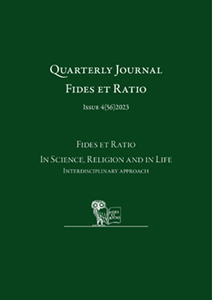Abstract
Influencer’s era–the role of experts in the digital world. Do we still need their forecasts and advice? We live in an information society. Estimates show that by 2025 global data production will increase to over 180 zettabytes. Along with the dissemination of the Internet, the development of digital communication and the reduction of digital exclusion, we are facing a serious crisis of expert culture. Over the years, it is experts who played an important role in society, today we ask where the border between professionals and specialists with specific knowledge, and experts-soremen, who gather hundreds of thousands of thousands of users in front of the screens of mobile devices in front of the screens of mobile devices in front of the screens of mobile devices. In the course of consideration of the above issues, the authors decided to develop a new expert definition based on a review of literature together with the use of the syncretic method and the original research model. The latter was successfully used in previous studies. As part of the considerations on the indicated issues, the authors focus on four key phenomena: Influencer marketing development–as a new variety of the so -called expert sector; virtual exhibitionism in the context of surveillance capitalism; functioning of the expert sector in the Bigdata era; The role of experts- futurists reaching for the models of forecasting the future. Is there still room for experts in the thicket of data? The answer to this question is the key to defining who the expert of the future will be.
References
A Netflix original documentary (2022). The Social Dilemma. (Za:) https://www.thesocialdilemma.com/ (access: 20.02.2023).
Barber, B.R. (2009). Skonsumowani: Jak rynek psuje dzieci, infantylizuje dorosłych i połyka obywateli. Warszawa: Warszawskie Wydawnictwo Literackie Muza.
Barber, B.R. (2013). Dżihad kontra mcświat. Warszawa: Warszawskie Wydawnictwo Literackie Muza SA.
Barone, L. (2013). The 5 types of influencers on the web. Small Business Trends. 15.07.2010. (From:) https://smallbiztrends.com/2010/07/the-5-types-of-influencers-on-the-web.html, (access: 12.02.2023).
Bawden, D. and Robinson, L. (2020). Information overload: An introduction. Oxford Research Encyclopedia of Politics. https://doi.org/10.1093/acrefore/9780190228637.013.1360
CBOE Volatility Index. (From:) https://www.cboe.com/tradable_products/vix/, (access: 22 April 2023).
Cialdini, R.B. (2022). Wywieranie wpływu na ludzi: Teoria i Praktyka. Sopot: Gdańskie Wydawnictwo Psychologiczne.
Da, Z., Engelberg, J. and Gao, P. (2011). In search of attention, The Journal of Finance, 66(5), 1461-1499. https://doi.org/10.1111/j.1540-6261.2011.01679.x
Edmunds, A. and Morris, A. (2000). The problem of information overload in business organisations: A review of the literature. International Journal of Information Management, 20(1), 17-28. https://doi.org/10.1016/s0268-4012(99)00051-1
Feather, J. (2017). The Information Society: A Study of Continuity and Change. London: Facet Publishing.
Floridi, L. (1999). Philosophy and computing: An introduction. London: Routledge.
Fraiberger, S. et al. (2018). Media sentiment and international asset prices. https://doi.org/10.3386/w25353
Gao, X. et al. (2021). Media coverage and Investment Efficiency. Journal of Empirical Finance, 63, 270-293. https://doi.org/10.1016/j.jempfin.2021.07.002
Hall, J.L. and Tacon, P.B. (2010). Forecast accuracy and stock recommendations. Journal of Contemporary Accounting and Economics, 6(1), 18-33. https://doi.org/10.1016/j.jcae.2010.04.003
Interactive Advertising Bureau, (2018). Inside Influence: IAB Influencer Marketing for Publishers Guide. (From:) https://www.iab.com/wp-content/uploads/2018/01/IAB_Influencer_Marketing_for_Publishers_2018-01-25.pdf?ref=influenceweekly.co (access: 22.04.2023).
Johnson, B., (2010). Privacy no longer a social norm, says Facebook founder, (From:) https://www.theguardian.com/technology/2010/jan/11/facebook-privacy, (Access: 22.04.2023).
Kahneman, D., Sibony, O. and Sunstein, C.R. (2022). Szum czyli skąd się biorą błędy w naszych decyzjach. Poznań: Media Rodzina.
Kaplan, A.M. and Haenlein, M. (2010). Users of the world, unite! the challenges and opportunities of social media. Business Horizons, 53(1), 59-68. https://doi.org/10.1016/j.bushor.2009.09.003
Katsagounos, I. et al. (2021). Superforecasting reality check: Evidence from a small pool of experts and expedited identification. European Journal of Operational Research, 289(1), 107-117. https://doi.org/10.1016/j.ejor.2020.06.042
Klapp, O.E. (1986). Overload and boredom: Essays on the quality of life in the information society. Westport, CT: Greenwood Press.
Leung, F.F., Gu, F.F., Li, Y., Zhang, J.Z., & Palmatier, R.W. (2022). Influencer Marketing Effectiveness. Journal of Marketing, 86(6), 93-115. https://doi.org/10.1177/00222429221102889
Loh, R.K. and Mian, G.M. (2006). Do accurate earnings forecasts facilitate superior investment recommendations?. Journal of Financial Economics, 80(2), 455-483. https://doi.org/10.1016/j.jfineco.2005.03.009
Łuczuk, P. (2017). Cyberwojna: Wojna Bez Amunicji?. Kraków: Biały Kruk.
Łuczuk, P. and Maj, S. (2022). Can stock market fluctuations be predicted? Wig.games index secret on the example of CD project. Social Communication, 8(1), 8-20. https://doi.org/10.2478/sc-2022-0002
Orlowski, J. (2022). We need to rethink social media before it’s too late. We’ve accepted a Faustian bargain. Guardian, (From:) https://www.92ny.org/archives/the-social-dilemma (access: 22.04.2023).
Osnos, E. (2018). Can Mark Zuckerberg fix Facebook before it breaks democracy?. The New Yorker. (From:) https://www.newyorker.com/magazine/2018/09/17/can-mark-zuckerberg-fix-facebook-before-it-breaks-democracy (access: 20.02.2023).
Redzisz, M. (2020). Michał Kosiński: Wojnę o prywatność już przegraliśmy. Sztuczna Inteligencja. (From:)https://www.sztucznainteligencja.org.pl/michal-kosinski-wojne-o-prywatnosc-juz-przegralismy/ (access: 20.02.2023).
Song, H., Jung, J. and Kim, Y. (2016). Perceived news overload and its cognitive and attitudinal consequences for news usage in South Korea. Journalism & Mass Communication Quarterly, 94(4), 1172-1190. https://doi.org/10.1177/1077699016679975
Stanley, A.J. (1997). Information overload–myth or reality?. IEE Colloquium on IT Strategies for Information Overload. https://doi.org/10.1049/ic:19971146
Świstow, A. et al. (2016). Influencer marketing – praktycznie. (From:) https://www.loswiaheros.pl/zdjecia/influencer-marketing-praktycznie-whitepress.pdf (access: 10.02.2023).
Tandoc, E.C. and Kim, H.K. (2022). Avoiding real news, believing in fake news? investigating pathways from information overload to misbelief. Journalism, 24(6), 1174-1192. https://doi.org/10.1177/14648849221090744
Taylor, P. (2022). Total Data Volume Worldwide 2010-2025, Statista. (From:) https://www.statista.com/statistics/871513/worldwide-data-created/ (access: 12.02.2023).
Tetlock, P.E. and Gardner, D. (2019). Superforecasting: The art and science of prediction. London: Random House Business.
The good judgment project (2023). (Za:) https://en.wikipedia.org/wiki/The_Good_Judgment_Project (access: 22.07.2023).
Vaidhyanathan, S. (2018). Antisocial media: Jak facebook oddala nas od siebie i zagraża demokracji. Warszawa: Wydawnictwo W.A.B. – Grupa Wydawnicza Foksal.
Waszewski, J. (2021). Nie ukryjesz się: Konsekwencje synergii Big Data, mediów społecznościowych i neuronauki. Warszawa: Wydawnictwo Akademii Sztuki Wojennej.
Wierciszewski, M. (2014). Ekspert kontra małpa. (From:) https://www.pb.pl/ekspert-kontra-malpa-757525 (access: 10.02.2023).
Wójcik, M. Mały Leksykon postprawdy. (From:) https://wid.org.pl/wp-content/uploads/E_wydanie-Ma%C5%82y-Leksykon-Postprawdy.pdf (access: 20.02.2023).
Zuboff, S. (2020). Wiek kapitalizmu inwigilacji: walka o przyszłość ludzkości na nowej granicy władzy. Poznań: Zysk i S-ka.

